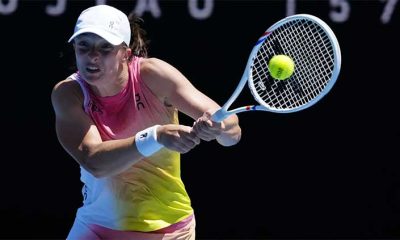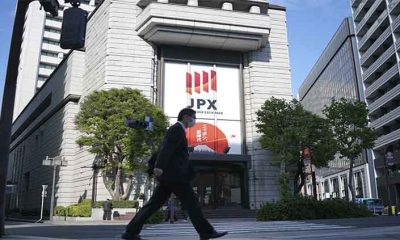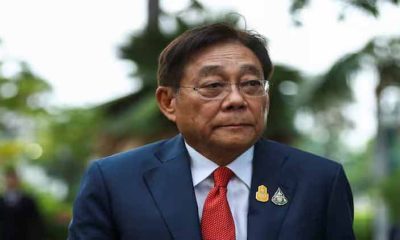Tech
Alphabet, Nvidia invest in OpenAI co-founder Sutskever’s SSI

Alphabet (GOOGL.O) and Nvidia (NVDA.O) have joined prominent venture capital investors to back Safe Superintelligence (SSI), a startup co-founded by OpenAI’s former chief scientist Ilya Sutskever that has quickly risen to become one of the most valuable artificial intelligence startups months after its launch, a source familiar with the matter said.
The funding illustrates renewed interest from the big tech and infrastructure providers in making strategic investments in the startups developing cutting-edge AI that requires massive amounts of computing power. Alphabet, which has its own AI models, earlier in the week announced a deal by its cloud computing arm to sell SSI access to tensor processing units (TPUs), its in-house AI chips.
SSI, which sources say was recently valued at $32 billion in a round led by Greenoaks, is one of the highest-profile startups working on AI model research, thanks to Sutskever’s stellar track record in predicting the next big thing in AI development.
Like many of its competitors, it has a huge demand for chips.
Reuters could not determine the exact terms of Alphabet’s and Nvidia’s investment in SSI. Spokespeople for all three companies declined to comment.
The twin moves by Alphabet’s corporate and cloud division with high-profile AI labs including SSI and Anthropic show the tech giant’s evolving AI hardware strategy.
Google originally reserved TPUs for in-house use. The deal to sell SSI chips in significant quantities to support its frontier AI research exemplifies the company’s ongoing strategy to expand sales to external customers, Darren Mowry, a managing director in charge of Google’s partnerships with startups, said in an interview with Reuters this week.
“With these foundational model builders, the gravity is increasing dramatically over to us,” he said.
AI developers have historically preferred Nvidia’s graphics processing units, which hold more than 80% of the AI chips market.
But SSI is so far primarily using TPUs rather than GPUs for its AI research and development, two sources said.
Google offers both Nvidia GPUs and its own TPUs through its cloud service. Its own chips are intended to excel at specific AI tasks and are more efficient than general-purpose GPUs. These chips have been used to build large-scale AI models, such as Apple(AAPL.O) and Anthropic, an OpenAI competitor that has received billions of dollars of funding from Google and Amazon (AMZN.O).
Google and Nvidia also face a challenger in Amazon, which is building its own competing processors called Trainium and Inferentia. Amazon has said as far back as 2023 that Anthropic would develop its technology on those chips. The tech giant announced in December that Anthropic would be the first customer to use a massive supercomputer powered by hundreds of thousands of its own chips.
In the meantime, Anthropic continues to use TPUs for its AI development and has not decreased spending on Google’s chips, two sources said.
It is increasingly common for major cloud providers to invest heavily in AI startups that not only build foundational models but also serve as significant customers of their infrastructure. For instance, Amazon and Google have both invested in Anthropic, while Microsoft (MSFT.O) has placed substantial bets on OpenAI. Nvidia has also backed OpenAI, as well as Elon Musk’s xAI.
Tech
Group of ex-OpenAI employees back Musk’s lawsuit to halt OpenAI restructure

A dozen former OpenAI employees filed a legal brief on Friday backing co-founder Elon Musk’s lawsuit aimed at keeping the non-profit status of OpenAI, marking the latest development in the dispute over the future of the artificial intelligence firm.
Corporate leaders want to give investors control, drawing a host of concerns and a lawsuit from Musk and others who say business interests must be subordinated to humanitarian goals.
Last year, Musk, who is also the CEO of electric carmaker Tesla (TSLA.O), sued OpenAI and its CEO Sam Altman, accusing OpenAI of straying from its founding mission – to develop AI for the good of humanity, not corporate profit. OpenAI and Altman have denied the allegations.
In their federal court filing on Friday, the former employees contended that stripping the nonprofit of its controlling role would “fundamentally violate” its mission, as it would lose oversight of the for-profit AI development entity.
The former OpenAI employees, who said they held technical and leadership roles in the company, said the nonprofit’s oversight was crucial to its overall strategy, and that while they worked at the firm, OpenAI executives had emphasized repeatedly the structure’s importance in OpenAI’s ability to execute on its mission. The structure also helped with recruitment, and many employees joined because they were inspired by the nonprofit’s mission, they said.
OpenAI has argued that it needs to remove the nonprofit’s controlling role in order to raise funds from investors. The nonprofit will retain a stake in OpenAI that will become increasingly valuable as the company grows, enriching the nonprofit with deep resources to carry out its mission, the company argues.
In a statement, OpenAI said the transition would not affect its mission: “Our Board has been very clear: our nonprofit isn’t going anywhere and our mission will remain the same.”
Musk and Altman cofounded ChatGPT maker OpenAI in 2015, but Musk left before the company became a technology star. Musk’s opposition to the change in structure led to the current suit, and the two parties are set to begin a jury trial in spring next year.
Recently Musk also went on to create his own AI firm, xAI, in 2023, and Altman alleges that Musk has been trying to slow down a competitor.
In the Kenyan village of Kamathatha, farmer-turned-seed advocate Martha Njenga is teaching fellow villagers traditional seed preservation methods – empowering them to save and replant seeds season after season.
OpenAI, meanwhile, faces pressure from investors to change its structure. In order for OpenAI to secure a $40 billion fundraising round, the company must complete its transition by the end of the year.
Tech
US exempts smartphones, computers from global Trump tariffs

The Trump administration has exempted smartphones, computers and other electronics from its punishing “reciprocal” tariffs — lessening the cost impact on American consumers for a host of popular high-tech products.
The exemptions, published late on Friday in a notice by the US Customs and Border Protection office, cover various electronic goods, including smartphones and components entering the United States from China, which are currently subject to a staggering additional 145 per cent tariff.
Semiconductors are also excluded from the “baseline” 10pc tariff on most US trading partners and the added 125pc levy on China.
The exclusions narrow the range of sweeping 10pc levies announced by US President Donald Trump earlier this month, and the punishing additional rate on goods from China.
Trump has targeted China, especially with his “reciprocal tariffs” meant to address practices Washington deemed unfair, most recently introducing a new 125pc tariff on goods from the world’s second-biggest economy that took effect this week.
The rate piled atop an earlier 20pc levy Trump imposed over China’s alleged role in fentanyl supply chains, and other existing tariffs from previous administrations — taking the full figure to at least 145pc for many products.
Many of the exempted products, including hard drives and computer processors, generally are not made in America.
While Trump has referred to tariffs as a way to bring manufacturing back to the United States, it will likely take years to ramp up domestic manufacturing.
Tech
Meta to add Dina Powell McCormick, Patrick Collison to board

Meta Platforms (META.O) will add former Republican official Dina Powell McCormick and fintech firm Stripe’s CEO Patrick Collison to its board, effective April 15, the social media company said on Friday.
The Facebook parent said in a regulatory filing that it is increasing the size of its board to 15 members.
Powell McCormick, who spent 16 years in senior leadership roles at Goldman Sachs (GS.N), has previously served as deputy national security adviser to U.S. President Donald Trump in his first term.
She has also served as a senior White House adviser and as assistant secretary of state for Condoleezza Rice under President George W. Bush.
Collison, who co-founded Stripe in 2010, was earlier a part of the Meta Advisory Group, which is an external advisory council established by the company to provide guidance on technology and product development.
“Patrick is deeply committed to expanding economic opportunity, and Dina has a long career advocating for economic development and supporting entrepreneurs,” CEO Mark Zuckerberg said in a statement.
The board additions come after Meta announced big policy changes earlier this year, including scrapping its U.S. fact-checking program, elevating Republican Joel Kaplan as the company’s new chief global affairs officer, and ending its diversity programs.
In January, the company elected three new directors to its board including Dana White, CEO of Ultimate Fighting Championship and a close friend of Trump.
Meta’s board also include Marc Andreessen, co-founder of venture capital firm Andreessen Horowitz, and Tony Xu, CEO of DoorDash (DASH.O).
-

 Business3 months ago
Business3 months agoFinance Minister Aurangzeb discusses bilateral cooperation with Japanese envoy
-

 pakistan3 months ago
pakistan3 months agoSC additional registrar submits response to show-cause notice in contempt case
-

 Entertainment3 months ago
Entertainment3 months agoWhat Khalil-ur-Rehman Qamar feels about Mahira Khan
-

 Sports3 months ago
Sports3 months agoSwiatek powers into Raducanu clash as Fritz fires Melbourne warning
-

 Tech3 months ago
Tech3 months agoMicrosoft’s LinkedIn sued for disclosing customer information to train AI models
-

 World3 months ago
World3 months agoSaudi Arabia plans 600bn dollars in new US investment, trade over four years
-

 pakistan3 months ago
pakistan3 months agoMohsin Naqvi sees new chapter in Pak-US relations under Trump
-

 Business2 months ago
Business2 months agoSaudi oil giant Aramco reports $106 billion profit in 2024, down 12pc on lower energy prices


















